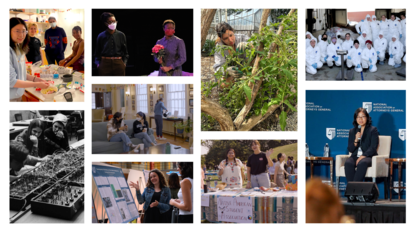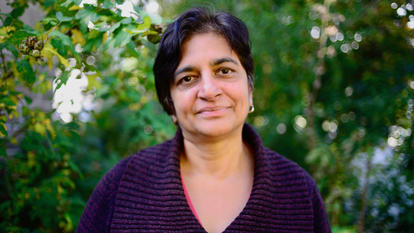Harshbeena Sahney Zaveri ’82 Named One of India’s Most Powerful Women in Business by Fortune India magazine

When Fortune India magazine recently named Harshbeena Sahney Zaveri ’82 one of India’s Most Powerful Women in Business for 2016, the award “validated my belief that leaders emerge from challenging situations,” she said.
Fortune India praised Zaveri for the flexibility and foresight she has demonstrated in the past year as vice chairman and managing director of NRB Bearings, a company founded by her father that manufactures bearings, rollers, bushes, and cages for the automotive industry; the company’s clients include Ford, Volvo, Honda, and Audi. While many suppliers and vendors were affected by the recent major shakeup at Volkswagen, NRB compensated for the loss under Zaveri’s leadership. She also landed two new big-name clients (Ducati and Mitsubishi) and began developing parts for drones.
Zaveri wasn’t planning on a business career when she majored in urban studies and anthropology at Wellesley. After graduating summa cum laude with an honors thesis, she returned to India, earned a degree in education, and taught English and geography to 10th-graders at J.B. Petit High School for Girls, a private school in Mumbai, which she had attended. “Our high school was similar to Wellesley and focuses on creative innovation and assertive thinking,” she said.
She joined NRB as a management trainee in 1987, at her family’s request, but chose to work as a factory shop-floor apprentice so that she could understand how products were manufactured and build relationships with the machine operators, whom she considered important stakeholders.
Later, she worked as head of purchasing, in business development, and in human resources, because “no one else wanted to be in charge of these difficult functions at that time,” she said. She also set up a research and development center and began to develop next-generation gear boxes and transmissions.
“What some people considered a disadvantage—my liberal arts background and the lack of an engineering degree—gave me an edge,” she said. “In fact, my two majors made me a specialist in urban subcultures, and I soon realized that this, along with my teaching experience, enabled me to recognize technological, economic, and political trends well in advance and leverage the impact of demographics.”
Her work and her interest in creating an innovative culture that was open to change helped the company adapt to the challenges of India’s changing economy, which appealed to Indian customers and increasingly to global companies, she said.
In 2001, the board of directors named Zaveri president of NRB, which employs more than 1,200 people and grosses more than $100 million annually. Six years later, the company was recognized by Forbes magazine as one of Asia’s top 200 companies under $1 billion, and in 2011, Fortune India included Zaveri in its Most Powerful Women in Business list for the first time.
“Wellesley prepared me to take risks and break tradition,” she said. “Of course there have been hard situations that have kept me awake at night, but I remind myself of the good that resulted from difficulties in the past, and that keeps me grounded.”
The support and insight of fellow alumnae also keep her grounded, as does advocating for the College, she said. She has been involved in the admission process for more than 25 years, helping Wellesley recruit prospective students from India, where the higher education system is dominated by engineering and vocational institutes.
She was also instrumental in founding Ashoka University in Delhi, the first private Ivy League-caliber liberal arts institution in India, and in establishing a partnership between Ashoka and Wellesley.
At the signing celebration, held in January 2016, Zaveri said, “In many ways, Ashoka has modeled its mission, in a remarkably similar manner to that of Wellesley. …Both institutions focus on developing leaders with an emphasis on social consciousness, effective problem solving, and bigger-picture capabilities. As the sole female founder of Ashoka, I feel a special responsibility in driving the university’s aspirations of women empowerment.”
The Wellesley Centers for Women and Ashoka’s women’s research center have begun working together, and faculty and students from Ashoka have come to the Madeleine Korbel Albright Institute for Global Affairs to learn how they can create a similar model center. In 2017, faculty from both schools will travel to each other’s campuses for academic exchanges.
“Harshbeena is just a vociferous voice for Wellesley,” said Joanne Murray, director of the Albright Institute. “What distinguishes her is not just her leadership in business, but the fact that she is always thinking about how Wellesley can be part of important change initiatives.”
“I learned very early on that women can head organizations and be at the very top of the field that they choose to enter,” said Zaveri. “I believe that women leaders must give time, not just money, towards nurturing other women and mentoring young people and those who are from underserved communities.”



